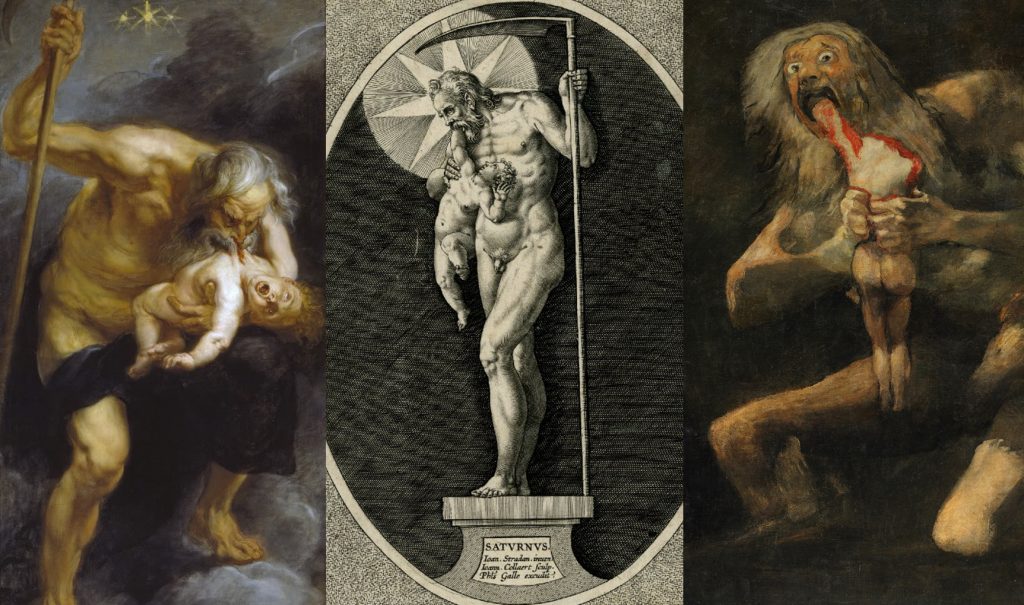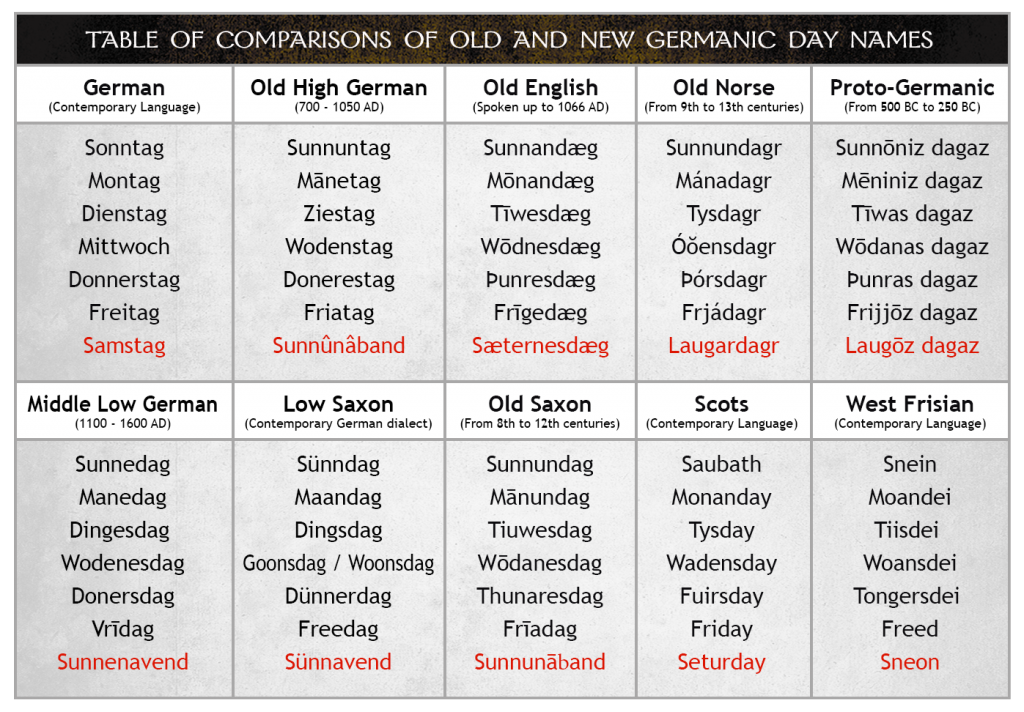This article is a newly extended continuation (or should I say an appendix) of another article I wrote for Renegade Tribune back in November 2015 entitled See You On Wodensday, which I believe was quite well-received judging by the reactions. Being perfectly honest I cannot really dissimulate my extreme antipathy for the god Saturn ‘Abrahamic style’ (a.k.a Yahweh), although the original Roman version of the deity is also of a very ambiguous nature, for a number of reasons to say the least. This is something I will try to elaborate in a future article of a somewhat far-out tinge, an article which I intend to put together whenever my tight schedule abides. But let’s go down with it…
In a process known as Interpretatio Germanica the West Germanic peoples adapted their Gods to the Roman system of days, except in the case of ‘Saturday’ (why the West Germans didn’t do it is anyone’s guess). This event is supposed to have happened about the time of the fall of the Western Roman Empire (285-476 AD) and long before the introduction of Christianity in the 6th to 7th Centuries. Likewise the North Germanic peoples adapted their day-names from their West Germanic counterparts, not directly from the Roman system.
Most names in the table are of astronomical origin except, for instance Laugardagr (Old Norse) and Laugōz dagaz (Proto–Germanic), both for Saturday, which literary meant ‘Bath-Day’. Notice the word Laugōz is almost similar to the word Laguz which means ‘water’ or ‘lake’ in Old Norse, like the Elder Futhark rune of the same name.
The other denomination for ‘Saturday’, other than Samstag in contemporary German, is Sonnabend which means ‘Sun-eve’ or ‘Eve of Sunday’, so we have here names like Sunnûnâband (Old High German), Sunnunāƀand (Old Saxon), Sunnenavend (Middle Low German), Sünnavend (Low Saxon) and so on. Though I personally believe this might likely derive from the other name for Saturday in Old Norse; Sunnunótt (this is something I would like to further investigate myself). Here there is a quote from an article entitled What’s the difference between Samstag, Sonnabend and Sonntag? by Ingrid Bauer, which might shed some light on the etymology of the word.
‘Historically the term “Sonnabend”, which means “The evening before Sunday”, can be traced back surprisingly to an English missionary! It was none other than St. Bonifatius, who was determined during the 700’s to convert the Germanic tribes in the Frankish empire. One of his items on his to-do list was to replace the word “Samstag” or “Sambaztac” as it was known then, which was of Hebraic origin (Shabbat), to the Old English term “Sunnanaefen.” This term made sense since it signified the evening and later on the day before Sunday and thus was easily integrated into old high German. The term “Sunnanaefen” evolved into the middle high German “Sun[nen]abent” and then finally into the version we speak today.’
In spite of the insistence of making Saturday the official “Day of Saturn” names like Sonnabend have somewhat survived in Eastern and Northern Germany to the point of being there the official designation for ‘Saturday’.
The ‘Day of Saturn’, which was of Roman origin, either replaced or cohabited with the Germanic ‘Sun-eve’ and the Nordic ‘Bath-day’ (the latter to a much lesser degree) regardless of astrological or non-astrological significance: Satarnesdag with Sunnunāƀand (in Old Saxon), Saterdei with Sneon (in West Frisian), Saterdag with Sünnavend (in Low Saxon), Saturnas dagaz with Laugōz dagaz (in Proto-Germanic), Satersdag with Sunnenavend (in Middle Low German) und so weiter und so weiter. In spite of all this the ‘Bath-Day’ tradition was finally able to survive in practically all Scandinavia with names such as Lördag (in Swedish), Lørdag (in Danish and Norwegian Bokmål), Laurdag (Norwegian Nynorsk), Lauantai (Finnish), Laugardagur (Icelandic) and Leygardagur (Faroese), all names for ‘Saturday’.
As a final note for the chart above, the name Goonsdag or Woonsdag, which was the equivalent for ‘Wednesday’ in Low Saxon, was finally changed to Middeweek at some point in history. In the same way we have the German Mittwoch instead of Wodenstag nowadays – Sad.
But why a “Saturni Dies”?
Going back to the main point of contention; Saturn, among other things, was equated with the Carthaginian God Ba’al Hammon, which demanded child sacrifice, El (a.k.a as Kronos) and also as exposed to YHWH, whose Sabbath was first referred to as Saturni Dies (Saturn’s Day). This was obviously the origin of the world ‘Saturday’ as we know it, not only in the English language, but in many other European languages. It is said that Saturn was used by Romans in translation when referring to “severe Gods from other cultures”, suffice to say the Roman version of Saturn also demanded male sacrifice (virorum victimis) at some point. The obvious cruelty displayed by Saturn comes directly from his identification with the Greek god Cronus, known for devouring his own children (hence why ‘child sacrifice’ specifically I assume), whether one takes this as a metaphorical/symbolic representation or not.
According to the documentary Symbols of an Alien Sky (2012) by David Talbott and Wallace Thornhill, planet Saturn is portrayed in mythology as our “original sun” where it was fixed in the heavens at Earth’s celestial north pole and from where it watched over the ancients like the “All-Seeing Eye of God”. That in a way could reflect why the Romans considered Saturn as a “benevolent” deity who once ‘reigned during a primeval period of plenty and peace’ (according to Hesiod and Ovid), but after exposing all the previous facts it becomes a tad difficult to feel any reciprocation for the deity in question, whether those claims by Talbott and Thornhill have any basis in reality or not (claims which I don’t necessarily disprove). All these obviously Molochian ‘child sacrifices’ make one think immediately of recent events such as #Pizzagate, all this without mentioning that – in my personal opinion and the opinion of others – the fire-bombardments of Hamburg and Dresden during the final stages of WWII were basically Molochian ritual-sacrifices performed by the criminal banking Elite Saturn-worshippers who rule over us.
The Gnostics and early Kabbalists identified Saturn with the psychopathic demiurge god of the Old Testament whom they regarded as a tyrannical father, obsessed with the rigid enforcement of the law. As many people reading this know quite well this is represented in the three Jewish-created Abrahamic religions with black cube symbols such as the “Tefillin” (worn by Rabbis in morning prayers as a reminder to follow Jewish law to the hilt or else), the Kaaba (the giant black cube at Mecca with its counterclockwise-revolving ant-like Muslim worshipers) but also the Christian cross. Is it a coincidence that the ancient Roman symbol for Saturn consists of a very Christian-looking cross attached to a sickle?… a ‘sickle’ did I say?
Let’s not forget that Jewish blood-ritual also demands almost exclusively child sacrifice (check “the torture and death of Saint Simon” among others), even if the act itself is performed in a different way for slightly different purposes (to appease Rabbis’ blood-thirst instead of appeasing Saturn’s I guess), so the dots I am connecting here seem to be pretty rock-solid I’d say. I wonder if there is also a loose symbolic connection between sickles and circumcision, but this is just me here.

To conclude these thoughts, and leaving aside the subject of child sacrifice, the very connection of Saturn via the three Abrahamic religions makes me think also of the centuries-old attempt, by many of the representatives of this “deity”, to undermine the human spirit through cruelty, torture and execution (i.e. “rigid enforcement of the law”) via religion as tool of population-control.
So all this said, if someone has any idea about what name we could use to rename the seventh day of the week (or ‘sixth’ depending on which day one starts the week) let me know. Personally I have been thinking about this for a time now. All this might seem a bit cavalier for my part, but what the heck!… do we want to have a day dedicated to this “Saturn” of all the gods in any pantheon? Even if a monk – supposedly – came out with the name, would it be a bad thing renaming Saturday as Sünnavend (or Sunna’s Eve Day)?
Let’s entertain the idea.
References:
– Child Sacrifice, A Traditional Religious Practice in Ancient Israel by Rosemary Pennington (Oct 5, 2015) published by The National Vanguard
– Jewish Saturn Worship (July 22, 2016) by Axe of Perun, published by Renegade Tribune
– Saturn Death Cult The link between planetary catastrophe by Saturn Death Cult (saturndeathcult.com)
– What’s the difference between Samstag, Sonnabend and Sonntag? by Ingrid Bauer (About.com)
Source Article from http://www.renegadetribune.com/day-saturn-vs-old-germanic-days-week/
 RSS Feed
RSS Feed















 January 28th, 2018
January 28th, 2018  Awake Goy
Awake Goy 
 Posted in
Posted in  Tags:
Tags: 













